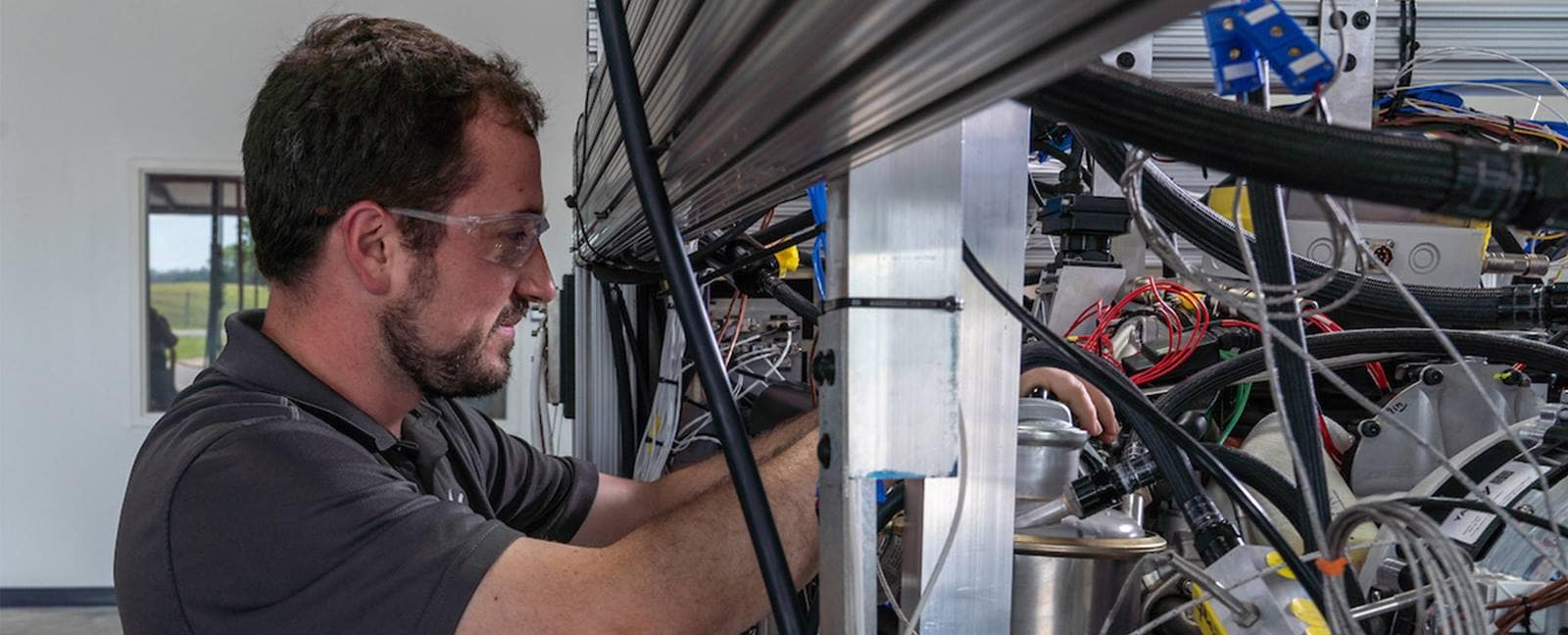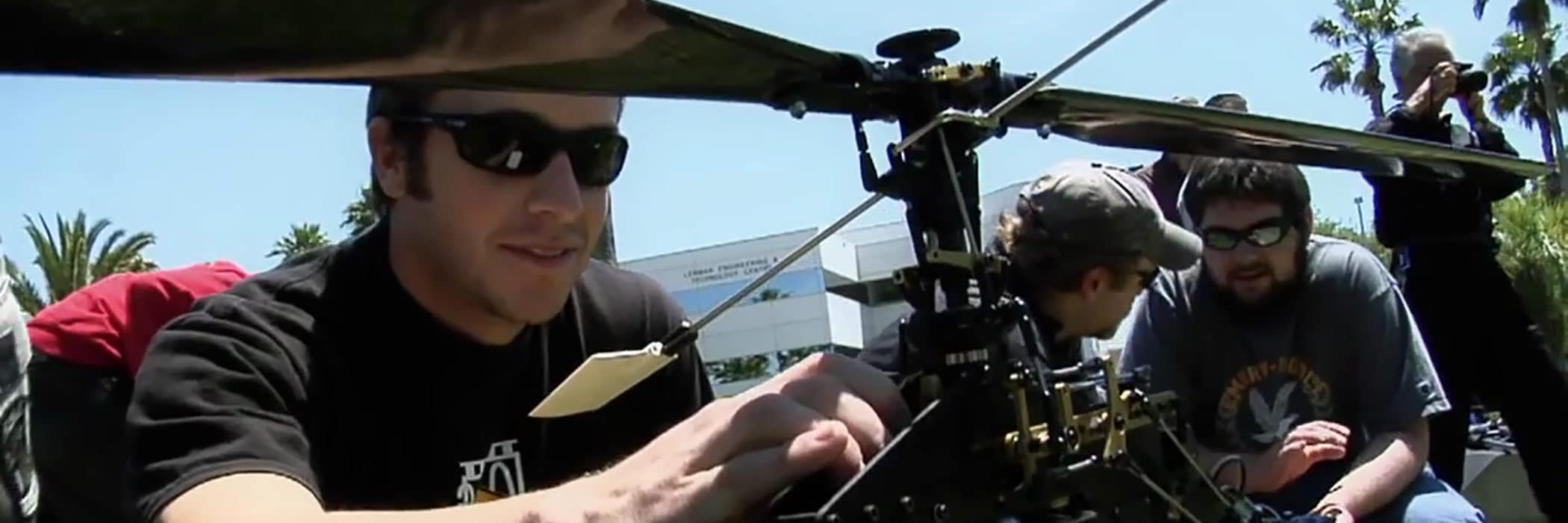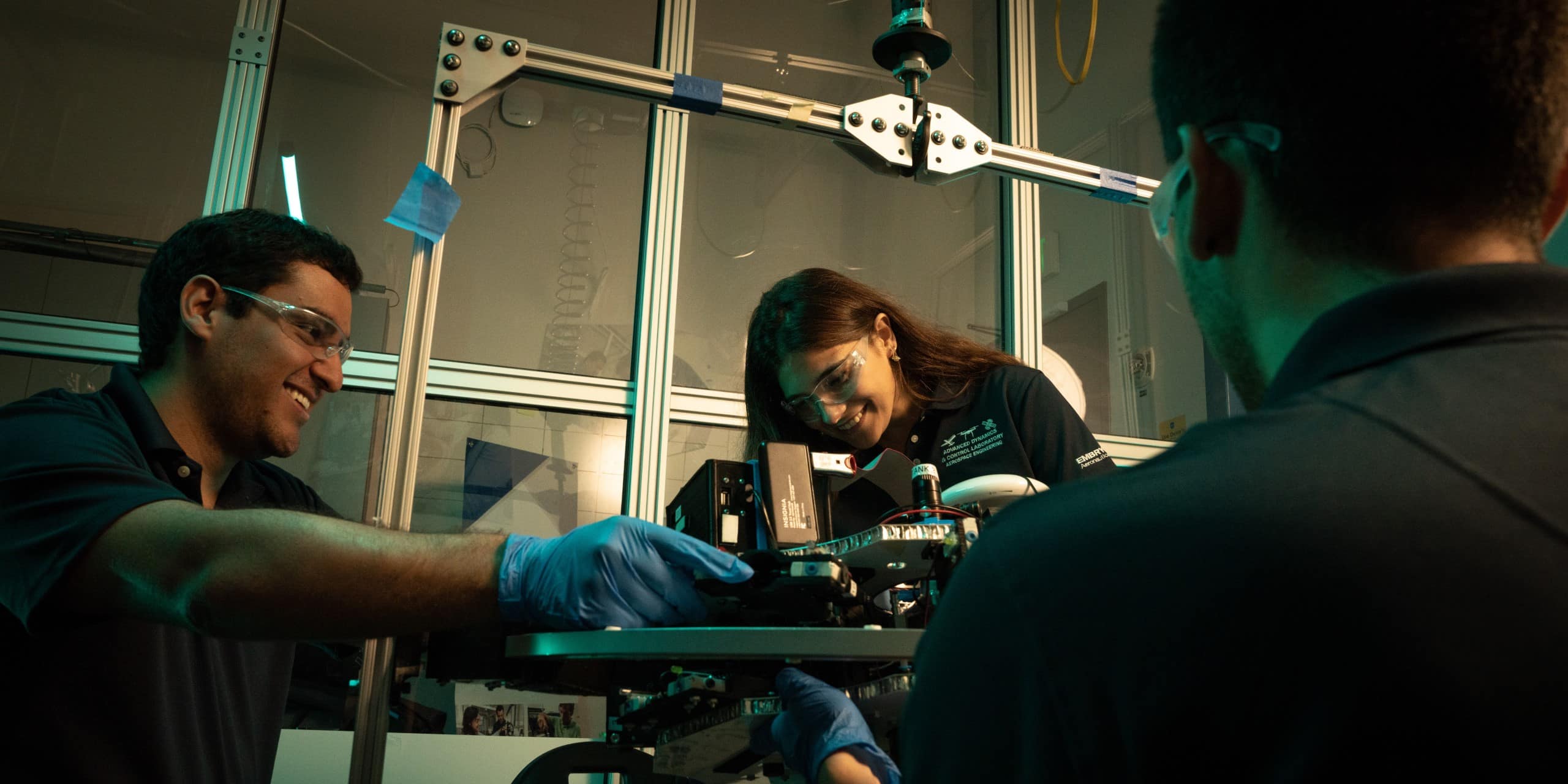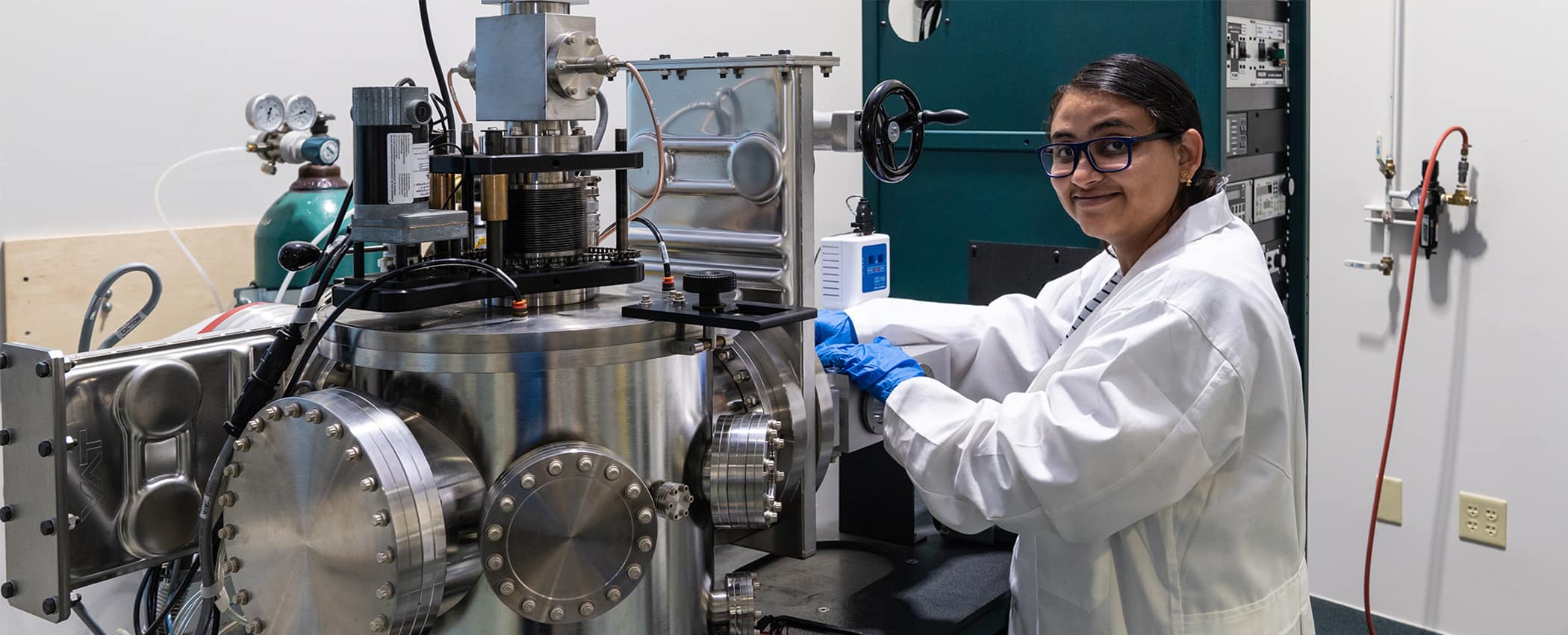
Master of Science in
Mechanical Engineering
Featuring specialized labs and facilities, this program prepares students to design and implement mechanical systems to meet the needs of a wide range of industries.
Embry‑Riddle's Master of Science in Mechanical Engineering focuses on the advanced study of mechanical systems. Graduates emerge ready to solve some of today's most critical problems in energy, transportation, automation and bio-mechanical systems.
Embry-Riddle’s Daytona Beach Campus engineering programs have ranked at the top of "U.S. News and World Report"’s lists for over a decade.
Master’s degree students will elect a thesis, graduate research project or non-thesis degree option, in addition to core courses that address both theory and practical implementation of mechanical engineering.
Research activities are under the direction of experienced, dedicated Embry-Riddle faculty and fellow students in state-of-the-art labs.
Master’s students can elect an area of concentration from High-Performance Vehicle, Robotics and Autonomous Systems, Thermal-Fluid Sciences, or General Mechanical Engineering.
Graduate students typically have many professional networking experiences and may pursue an internship relevant to their area of focus.
DETAILS
About Mechanical Engineering at the Daytona Beach, FL Campus
The Mechanical Engineering master's degree program at Embry-Riddle's Daytona Beach Campus provides students with advanced study in engineering. Featuring specialized labs and facilities, the program prepares students to design and implement mechanical systems to fulfill the needs of a wide range of industries in the aerospace, aviation, automotive, energy and biomedical arenas. Thesis and non-thesis options are available.
A typical first year will include core mechanical engineering courses, as well as mathematics and general electives.
Housed in the Department of Mechanical Engineering of the College of Engineering, the M.S. in Mechanical Engineering program gives students the choice of a broad track or one of three focused tracks, including:
- A broad track in mechanical systems designed to allow students to create a customized plan of study.
- A focused track in high-performance vehicles.
- A focused track in robotic systems.
- A focused track in thermal-fluid systems.
The Department of Mechanical Engineering also offers an accelerated program that gives well-qualified students the chance to begin their graduate work for the M.S. in Mechanical Engineering while finishing their Bachelor of Science in Engineering at Embry-Riddle.
Learn more about the Daytona Beach, FL campus
Details about Program Educational Outcomes, Student Learning Outcomes and Enrollment Data can be found on our Mechanical Engineering Program Accreditation Information page.
Student Learning Outcomes
Students will:
- Apply fundamental mechanical engineering professional practices to analyze, design, and implement mechanical engineering systems.
- Apply knowledge of advanced topics in mechanical engineering.
- Analyze and interpret appropriate research literature.
- Apply professional communication and oral presentation skills using appropriate media.
- Apply an ethical and professional framework to decision making.
Degree Requirements
The Master of Science in Mechanical Engineering is granted to students who complete the coursework described below. Students may choose Non-Thesis, Graduate Research Project, or Thesis Option. Thesis and GRP students are required to complete 12 credit hours in one of the Areas of Concentration listed below. Non-Thesis students are required to complete 15 credit hours in one of the areas of concentration below.
Thesis Option
| EGR 600 | Research Methods for Engineers | 3 |
| or ME 700 | Graduate Thesis | |
| ME 501 | Modeling Methods in Mechanical Engineering | 3 |
| ME 700 | Graduate Thesis | 6 |
| ME AOC Core Courses | 12 | |
| General Electives * | 6 | |
| Total Credits | 30 | |
Non-Thesis Option
| EGR 600 | Research Methods for Engineers | 3 |
| ME 501 | Modeling Methods in Mechanical Engineering | 3 |
| ME 540 | Mechanical Engineering Practicum | 3 |
| ME AOC Core Courses | 15 | |
| General Electives * | 6 | |
| Total Credits | 30 | |
GRP Option
| EGR 600 | Research Methods for Engineers | 3 |
| ME 501 | Modeling Methods in Mechanical Engineering | 3 |
| ME 690 | Graduate Research Project 1 | 3 |
| ME 692 | Graduate Research Project 2 | 3 |
| ME AOC Core Courses | 12 | |
| General Electives * | 6 | |
| Total Credits | 30 | |
Areas of Concentration
Thesis and GRP students are required to complete 12 credit hours in one of the Areas of Concentration listed below. Non-Thesis students are required to complete 15 credit hours in one of the Areas of Concentration below.
High-Performance Vehicles Core Courses
EE 505 | Advanced Mechatronics | |
ME 503 | Introduction to Autonomous Vehicle Systems | |
ME 508 | Hybrid and Electric Vehicles | |
ME 514 | Introduction to the Finite Element Method | |
ME 520 | Sensor Processing with Applications | |
ME 521 | HVAC Systems | |
ME 527 | Modern Control Systems | |
ME 530 | Advanced Kinematics and Mechanics | |
ME 620 | Advanced Vehicle Dynamics |
Robotics and Autonomous Systems Core Courses
EE 505 | Advanced Mechatronics | |
ME 503 | Introduction to Autonomous Vehicle Systems | |
ME 513 | Perception Methods for Autonomous Systems | |
ME 520 | Sensor Processing with Applications | |
ME 527 | Modern Control Systems | |
ME 530 | Advanced Kinematics and Mechanics | |
ME 532 | Field Robotics | |
ME 615 | Pattern Recognition and Machine Learning | |
ME 622 | Path Planning and Navigation |
Thermal-Fluid Sciences Core Courses
ME 500 | Clean Energy Systems | |
ME 511 | Computational Heat Transfer | |
ME 514 | Introduction to the Finite Element Method | |
ME 520 | Sensor Processing with Applications | |
ME 521 | HVAC Systems | |
ME 542 | Computational Biofluid Mechanics | |
ME 543 | Kinetic Modeling of Thermo-Fluids Transport | |
ME 601 | Advanced Modeling Methods in Mechanical Engineering | |
ME 614 | Multidisciplinary Design Optimization | |
ME 631 | Conduction and Radiation Heat Transfer | |
ME 632 | Convection Heat Transfer | |
AE 508 | Intermediate Heat Transfer | |
AE 521 | Viscous Flow | |
AE 610 | Advanced Computational Fluid Dynamics | |
AE 652 | Turbulent Flows |
General Mechanical Engineering Core Courses
EE 505 | Advanced Mechatronics | |
ME 500 | Clean Energy Systems | |
ME 503 | Introduction to Autonomous Vehicle Systems | |
ME 506 | Design for Manufacturing and Assembly | |
ME 508 | Hybrid and Electric Vehicles | |
ME 511 | Computational Heat Transfer | |
ME 513 | Perception Methods for Autonomous Systems | |
ME 514 | Introduction to the Finite Element Method | |
or AE 514 | Introduction to the Finite Element Method | |
ME 520 | Sensor Processing with Applications | |
ME 521 | HVAC Systems | |
ME 522 | Mechanical System Design | |
ME 523 | Modeling and Simulation of Linear Dynamic Systems | |
ME 525 | Structural Design Optimization | |
ME 527 | Modern Control Systems | |
or AE 527 | Modern Control Systems | |
or EE 527 | Modern Control Systems | |
ME 530 | Advanced Kinematics and Mechanics | |
ME 532 | Field Robotics | |
ME 540 | Mechanical Engineering Practicum | |
ME 542 | Computational Biofluid Mechanics | |
ME 543 | Kinetic Modeling of Thermo-Fluids Transport | |
ME 544 | Computational Biomechanics | |
ME 548 | Introduction to Continuum Mechanics | |
or AE 548 | Introduction to Continuum Mechanics | |
ME 560 | Tissue Biomechanics | |
ME 601 | Advanced Modeling Methods in Mechanical Engineering | |
ME 610 | Automation and Additive Manufacturing | |
ME 612 | Computer Integrated Manufacturing | |
ME 613 | Advanced Model-Based Control Design | |
ME 614 | Multidisciplinary Design Optimization | |
ME 615 | Pattern Recognition and Machine Learning | |
ME 616 | Design and Manufacturing of Biomedical Devices | |
ME 620 | Advanced Vehicle Dynamics | |
ME 622 | Path Planning and Navigation | |
ME 631 | Conduction and Radiation Heat Transfer | |
ME 632 | Convection Heat Transfer | |
General Electives
- *
All ME AOC Courses
All 500 & 600 Level ME courses
Most 500 & 600 Level AE/EE/CIV/SE/CEC/CS courses with prior approval by MSME program coordinator
DS 540/544/615
EP 501/505/605
MA 502/504/510/520/541/543/550/553/610/625
Tentative Course Offering Schedule
Fall Semester
- Even years – ME 501, 503, 514, 520, 530, 540, 548, 631, 690
- Odd years - ME 501, 503, 508, 514, 520, 530, 540, 542, 548, 690
Spring Semester
- Even years – ME 511, 514, 525, 527, 540, 620, 622, 692, EGR 600
- Odd years – ME 511, 514, 525, 540, 560, 601, 615, 620, 692, EGR 600
(Note: ME 514, 525 and 548 are taught under ME and AE prefixes.)
Get Started Now:
Summary
30 Credits
Estimate your tuition by using the Tuition Calculator
View Financial Aid Information
Learn about our General Education
Find out about transferring credits to this degree
Learn more about our Veterans & Military benefits
View our Academic Calendar



